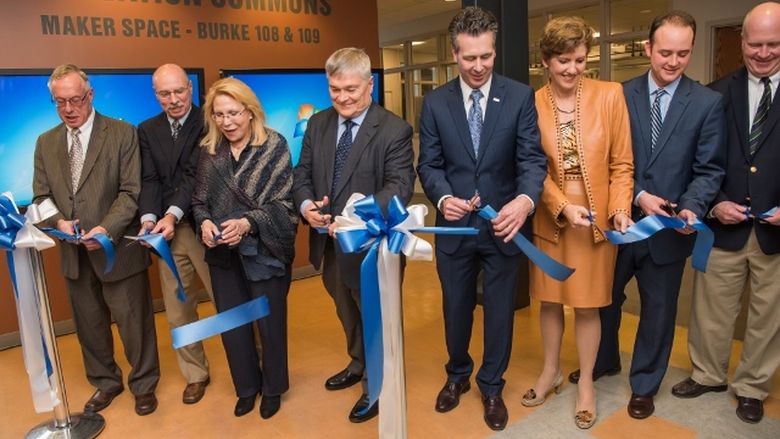Penn State Behrend has begun construction of a $112,000 “Innovation Commons,” a collaborative lab where students, faculty members and industry partners can develop product ideas, create prototypes and consult with lawyers, bankers, marketing experts and others who can support entrepreneurial projects.
The lab will be located in the Jack Burke Research and Economic Development Center. It will offer an instant support network for small businesses and start-ups – a key goal of the three-year, $1.5 million Ignite Erie initiative, a partnership of Penn State Behrend, Mercyhurst University and the Erie County Gaming Revenue Authority.
Penn State Behrend students and faculty members will have access to the lab, which will be equipped with AutoCAD modeling programs, scanners and 3D printers. So will employees at Knowledge Park, a research complex with 20 tenant companies.
The space will include whiteboards, soft seating and a small conference area. Twin 65-inch touch-screen monitors will link students to InnoCentive, a crowdsourced innovation management platform that has seeded more than $40 million in business and engineering projects.
The lab was funded in part by a $50,000 “Invent Penn State” grant. Penn State President Eric Barron launched the initiative in January, leveraging the University’s research, knowledge and entrepreneurial spirit to bring to market needed ideas, products and services.
Barron has committed $30 million to putting into place the organization and people to guide and support its partners along their entrepreneurial pathways: working with students to encourage ideation, then helping them to kick-start those ideas into promising new companies; collaborating with communities and corporations, making available Penn State’s massive intellectual resources; and partnering with alumni to mentor students, shepherd fledgling businesses and invest in promising, innovative start-ups.
Penn State’s Abington, Harrisburg, Lehigh Valley, New Kensington and Wilkes-Barre campuses also received funding.
By fostering small businesses and start-ups, the Innovation Commons could have a real effect on Erie’s economy: Entrepreneurs who connect with lawyers, designers and printers early in the process are less likely to move elsewhere once they have a support network in place.
Most also are open to working with other new companies.
“People who are entrepreneurial tend to encourage other people to think that way,” said David Causgrove, a lecturer in marketing at Penn State Behrend’s Black School of Business. “Rather than have a great idea and bury it, or hide it, and not tell anyone, you share it. You talk it through. As you do that, you often see new possibilities.”
The lab will provide a unique space where product ideas can be explored from technical and business perspectives simultaneously. Access to the expert service providers will help steer ideas beyond the initial “What if …?” stage of development.
“The Innovation Commons is designed to support entrepreneurship at its most critical phase: right at the beginning,” said Greg Dillon, associate director for research and technology transfer and associate professor of engineering at Penn State Behrend.
“Those who invent and create often don’t know how to assess the technical viability of their ideas,” Dillon said. “They also can be intimidated by the prospect of developing a business plan, protecting intellectual property or establishing a company. The Innovation Commons essentially forges a partnership between engineering and business that supports nascent ventures through this critical stage and leverages relationships with industry, economic development agencies and the broader community to seed economic growth in the region.”
